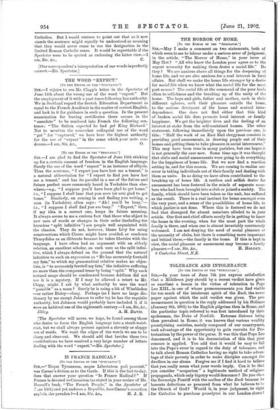THE HORROR OF HOME.
[To THE EDITOR 07 THE "SPECTATOR:1
Srn,—May I make a comment on two statements, both of which seem to me to labour under a serious error of judgment, in the article, "The Horror of Home," in your issue of May 31st? "All who know the London poor agree as to the urgent necessity for making them desire a social life." Do they ? We are anxious above all things for the deepening of home life, and we are also anxious for a real interest in local affairs. But shall we make the home life stronger by a desire for social life when we know what the social life for the most part means ? The social life at the command of the poor leads often to selfishness and the breaking up of the unity of the home. The boys and girls, father and mother, each in their different spheres, seek their pleasure outside the home, to the serious detriment of the home and mutual inter- dependence. One does not find either that this kind of broken social life does promote local interest or family happiness. We get the brighter lives and the feeling of an interest at stake from the self-contained homes. The other statement, following immediately upon the previous one, is this: "Half the work of an East End clergyman consists in providing good amusements, in drawing people out of their homes and getting them to take pleasure in social intercourse." This may have been true in many parishes, but one hopes it is not generally the case now. Some time ago it was thought that clubs and social amusements were going to do everything for the happiness of home life. But we now find a reaction setting in, and for this reason. We are coming to realise our error in taking individuals out of their family and dealing with them as units. In so doing we have often contributed to the breaking up of home life. A restless and selfish desire for amusement has been fostered in the minds of separate mem- bers who had been brought into a club or joined a society. The family, which should have been taken as the unit, has suffered as the result. There is a. real instinct for home amongst even the very poor, and a sense of the possibilities of home life, to which justice is not done. Where this is fostered we do not find that disregard for absent members alluded to in your article. Our first and chief efforts surely lie in getting to know the home in the evening, when for the most part the whole family is there, and when one is almost invariably courteously welcomed. I am not denying the need of social pleasure or the necessity of clubs, but there is something more important and behind these,—the family in the home. If this is kept in view, the social pleasure or amusement may become a family






































 Previous page
Previous page